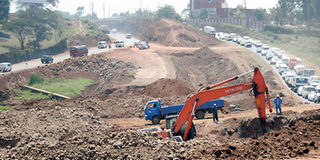Beijing ‘using cash to buy influence’

A section of Thika road under construction on September 9, 2010. According to a leaked cable, the US embassy linked growing Chinese influence in Kenya to corruption. Photo/FILE
American embassy officials in Nairobi attribute China’s increasingly dominant role in Kenya to a corruption ring run from the National Security Intelligence Service.
A cable dated February 17 links some NSIS officials to a ring which is pushing the Chinese cause in Kenya in return for monetary favours.
It gives a glimpse of the extent of discomfort China’s rise in Africa is having on the US administration.
But contacted for comment on the leaked cables, US ambassador Michael Ranneberger on Thursday said: “I cannot comment on the WikiLeaks issue”.
The cables claimed NSIS officials accepted cash to, among other things, cover medical expenses.
But the claims were immediately disputed by Government Spokesman Alfred Mutua who dismissed the cables as “perceptions by US embassy officials which could be way off the mark.”
NSIS officials have unlimited local and international medical cover for self and family and it would be unforeseeable for them to seek help from foreign powers.
The Government felt it was unforeseeable for an outfit with a budget of more than Sh8 billion to seek help from outside.
The cable posted on London’s Guardian on Wednesday claimed that China was providing weapons to Kenya “in support of its Somalia policies” and also indicated that the US was keeping a close eye on China’s rising influence in Kenya.
According to the cable, in January, China via CATIC, a military import-export corporation provided the Government of Kenya with “weapons, ammunition, supplies, and textiles for making uniforms” in support Kenya’s Jubaland initiative.
China is also said to be increasing their involvement with Kenyan intelligence community and is providing computers and telecommunications equipment to the Kenyan National Security and Intelligence Service (NSIS).
The cable alleges that the level of cooperation between the NSIS and their Chinese counterparts was causing concern after Chinese technicians whose presence was well known through the NSIS started working on a project in the basement of the NSIS headquarters as early as March 2009.
The cable claims that a corrupt Kenyan intelligence official pressured the Kenyan telecoms company to award a Chinese company a telephone monitoring equipment contract in August last year.
The official is said to have received bribes from the Chinese company while on a trip to China. Another official is said to have received monthly payments of over $5,000 (Sh390,000) that were used for medical payments.
The cables also accuse the Chinese of poaching Kenya’s wild life. Kenya Wildlife Service, they allege, noticed a marked increase in poaching wherever Chinese labour camps were located and in fact set up specific interdiction efforts aimed to address it.
KWS also reports that 90 per cent of the ivory smugglers detained at JKIA are Chinese. The US mission in Kenya wants the Chinese to participate in donor coordination.
Donors have encouraged Nairobi to bring China into the donor coordination process, but no progress has been made to date, the cable says.




